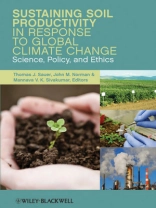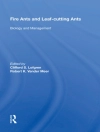Sustaining Soil Productivity in Response to Global Climate
Change: Science, Policy, and Ethics is a
multi-disciplinary volume exploring the ethical, political and
social issues surrounding the stewardship of our vital soil
resources. Based on topics presented by an international group of
experts at a conference convened through support of the
Organization for Economic Co-operation and Development, chapters
include scientific studies on carbon sequestration, ecosystem
services, maintaining soil fertility, and the effects of greenhouse
gas emissions, as well as ethical issues ranging from allocation of
land use to policies needed for climate change adaptation and
mitigation.
Bringing together the latest research in soil science and
climatology, Sustaining Soil Productivity in Response to Global
Climate Change is a valuable resource for soil and plant
scientists, agronomists and environmental scientists, as well as
agricultural and natural resources engineers and economists,
environmental policy makers and conservationists.
Key Features:
* Written by an international group of authors representing a
cross-section of scientists, thought leaders, and
policy-makers
* Includes chapters on the potential effects of climate change on
forest soil carbon, microbial function, and the role of soils and
biogeochemistry in the climate and earth system
* Explores historical development of land use ethics and
stewardship
Table des matières
Foreward
Sally Collins
Introduction
Thomas J. Sauer, John M. Norman, and Mannava V. K. Sivakumar
Chapter 1, Science, Ethics, and the Historical Roots of
Our Ecological Crisis – Was White Right?
Thomas J. Sauer and Michael P. Nelson
Chapter 2, Intellectual Inertia: An Uneasy Tension between Collective Validation
of the Known and Encouraging Exploration of the Unknown
John M. Norman
Chapter 3, The Ethics of Soil: Stewardship, Motivation and Moral Framing
Paul B. Thompson
Chapter 4, Aldo Leopold and the Land Ethic: An Argument for Sustaining Soils
Susan L. Flader
Chapter 5, Rural Response to Climate Change in Poor Countries: Ethics,
Policies and Scientific Support Systems in their Agricultural Environment
C.J. (Kees) Stigter
Chapter 6, Soil and Human Health
Eiliv Steinnes
Chapter 7, Agroecological Approaches to Help ‘Climate-Proof’ Agriculture While
Raising Productivity in the 21st Century
Norman Uphoff
Chapter 8, Ecological Integrity and Biological Integrity: The Right To Food
Laura Westra
Chapter 9, Soil Ecosystem Services: Sustaining Returns on Investment into
Natural Capital
Brent E. Clothier, Alistair J. Hall, Markus Deurer, Steven R. Green, and Alec D. Mackay
Chapter 10, Climate and Land Degradation
Mannava V.K. Sivakumar
Chapter 11, The Role of Soils and Biogeochemistry in the Climate and Earth System
Elisabeth A. Holland
Chapter 12, Net Agricultural Greenhouse Gases: Mitigation
Strategies and Implications
Claudia Wagner-Riddle and Alfons Weersink
Chapter 13, Overview on Response of Global Soil Carbon Pools to Climate and
Land Use Changes
Thomas Eglin, Philippe Ciais, Shi Long Piao, Pierre Barré, Valentin Bellassen, Patricia Cadule, Claire Chenu, Thomas Gasser, Markus Reichstein, and Pete Smith
Chapter 14, Potential Impacts of Climate Change on Microbial Function in Soil –
The Effect of Elevated CO2 Concentration
Paolo Nannipieri
Chapter 15, Impacts of Climate Change on Forest Soil Carbon: Uncertainties
and Lessons From Afforestation Case Studies
Philip J. Polglase and Keryn I. Paul
Chapter 16, The Effect of Forest Management on Soil Organic Carbon
Giustino Tonon, Silvia Dezi, Maurizio Ventura, Francesca Scandellari
A propos de l’auteur
Thomas J. Sauer is a Research Soil Scientist for the USDA Agricultural Research Service in Ames, Iowa.
John M. Norman is Emeritus Professor of Soil Science at the University of Wisconsin-Madison.
Mannava V. K. Sivakumar is Director of the Climate Prediction and Adaptation Branch of the World Meteorological Organization in Geneva, Switzerland.












